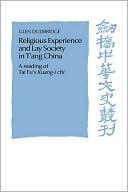

 |

|

The average rating for Religious Experience and Lay Society in T'ang China: A Reading of Tai Fu's Kuang-I Chi based on 2 reviews is 3 stars.
Review # 1 was written on 2013-04-03 00:00:00 Pamela Carlstrom Pamela CarlstromNienhauser has a great review of this book in _T'oung Pao_, assessing it alongside Campany's _Strange Writing_ and Paper's _Spirits are Drunk_, which came out at around the same time. Lot of terrific spadework and synthesizing the best in N. American, European, Japanese, and Chinese scholarship. But often I feel "the point" or an argument is buried beneath the data amassed. Also important to note that this is less a study of Dai Fu's collection than of closely reading selected anecdotes therefrom. The project is ultimately one of recovering alternative voices from the period and juxtaposing them against other accounts (official history; epigraphy; etc), and having them speak to issues of cult, spirit possession, spirit marriage, and other interactions with the proximate dead. The term "religious experience" in the title doesn't refer to anything mystical or romanticist; it only refers to people's narrated accounts of the dreamworld, the underworld, life after death, encounters with the supernatural etc. Methodologically speaking, I liked the recalibration of Braudel's three histories to Chinese religious history: imperceptible longue duree change (which is to say, structure), slow but perceptible (and often intellectually registered) change, history of events (second half of chapter three). I also liked the discussion and redeployment of the dualistic categories scholars of Ch. religion have often utilized unquestioningly, but I think rather than demonstrate how recalcitrant Dai Fu's notion of religion stands for dualistic analyses, this discussion serves to underscore the salience of categories like urban/rural, mountain/valley, man/woman, official/vernacular for Dai and his audience. Esp. useful is the appendix which usefully summarizes all of the accounts that have been attributed to Dai Fu's _Guangyi ji_, and explains where in the TPYL they were found, and who has translated them where. It is in skimming these summaries of 300+ surviving accounts that one realizes how selective Dudbridge was in choosing stories to dilate upon - TPYL at least seems to group stories thematically, and GD seems to leave several entire well-represented themes (stories involving animals, for instance, which seem to make up a whole third of the stories here) untouched. |
Review # 2 was written on 2019-01-12 00:00:00 Tony Jimmerson Tony JimmersonGood basic overview of some of the heavy hitters in the esoteric community from ancient times to the 19th century |
CAN'T FIND WHAT YOU'RE LOOKING FOR? CLICK HERE!!!